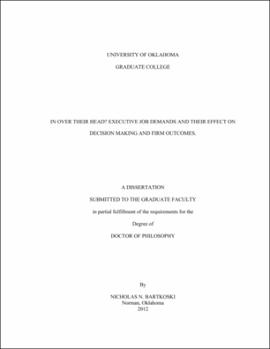| dc.contributor.advisor | Sharfman, Mark P | |
| dc.creator | Bartkoski, Nicholas Nelson | |
| dc.date.accessioned | 2019-04-27T21:38:26Z | |
| dc.date.available | 2019-04-27T21:38:26Z | |
| dc.date.issued | 2012 | |
| dc.identifier | 9939579202042 | |
| dc.identifier.uri | https://hdl.handle.net/11244/319235 | |
| dc.description.abstract | The business environment is more uncertain, dynamic and complex, organizations are more diverse and harder to manage, and owners demand greater and greater returns. From the perspective of CEOs, these factors, in tandem with the level of success they expect from themselves, have led the position of CEO to become increasingly demanding. This has led to over a thousand CEOs leaving their jobs in both 2008 and 2009. Job demands at the employee level have been a construct of interest, with demands positively related to mental strain, job dissatisfaction and burnout. However, demands also have been seen to benefit performance somewhat with an inverse-U shaped relationship between job demands and performance. While job demands at the employee level have been well researched, very little has been done at the executive level. The effect of job demands on top executives should be of great interest, given the high impact these executives' behavior has on the performance of a firm. | |
| dc.description.abstract | In this dissertation, I examine the effects of executive job demands first by operationalizing the construct using observable proxies for the previously proposed components of task challenges (created by environmental complexity as well as organizational characteristics such as diversification, slack, and support from the top management team), performance challenges (created by expectations for performance from owners and measured by the monitoring imposed on managers from the owners) and executive aspirations (created by a CEO's own expected level of performance). Using this operationalization, I examine how high job demands on a CEO affect their decision making process, specifically looking at how high demands might impact the rational decision making of a manager such that they will limit their search for alternatives and be more likely to make decisions that mimic the strategic behavior of other similar firms. I find some support for this hypothesis. This limited rationality in decision making is also expected to cause a manager to lean more upon his or her prior experiences, strengthening previously demonstrated relationships between demographic characteristics of managers (upper echelon proxies for top manager cognitions) and strategic outcomes. However, I find no support for this hypothesis. As a final impact on decision making, high job demands are expected to cause a manager to vacillate in their strategic choices, leading a firm to exhibit frequent changes in strategy or have high strategic dynamism. There is some support for this hypothesis. | |
| dc.description.abstract | This dissertation also considers the effect of executive job demands on firm performance, specifically that job demands will have an inverse-U shaped relationship with firm performance (ROA, ROE, ROI & Tobin's Q). This hypothesis is not supported, however, there is some support that high demands are related to lower financial performance. Under high job demands, firm performance may also tend vacillate from year to year (performance variability), and there is some support for this hypothesis. Finally, while I examine main effects on the financial performance outcomes, I also consider that the strategic processes of conformity and dynamism affect these relationships. However, I do not find support for a mediating role of dynamism or conformity on financial performance. | |
| dc.format.extent | 190 pages | |
| dc.format.medium | application.pdf | |
| dc.language | en_US | |
| dc.relation.requires | Adobe Acrobat Reader | |
| dc.subject | Chief executive officers | |
| dc.subject | Decision making | |
| dc.subject | Corporations--Finance | |
| dc.title | In over their head? Executive job demands and their effect on decision making and firm outcomes. | |
| dc.type | text | |
| dc.type | document | |
| dc.thesis.degree | Ph.D. | |
| ou.group | Michael F. Price College of Business | |
